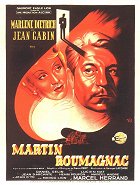Rendező:
Georges LacombeForgatókönyvíró:
Pierre VéryOperatőr:
Roger HubertZeneszerző:
Giovanni FuscoSzereplők:
Marlene Dietrich, Jean Gabin, Jean d'Yd, Daniel Gélin, Jean Darcante, Marcel Pérès, Margo Lion, Marcel Herrand, Marcel André, Marcelle Hainia (több)Tartalmak(1)
A második világháború után sorra visszatérnek Amerikából az emigrációba kényszerült nagy francia művészek. Dietrich és Gabin, ruhájukon a Becsületrend keresztjével, együtt ünnepel Párizs népével. Életükben először (és utoljára) közös filmet forgatnak, jóllehet a legendás szerelemnek vége, Gabin már hallani sem akar erről a tündökletes, karcsú és sápadt démonról. Közös filmjük egy elkésett lírai realista alkotás, szenvedélyes szerelmi dráma a jobb sorsra érdemes munkásról és kedveséről, a jó házból való úrilányról. A történet jelentősége elhalványul a filmtörténeti pillanat árnyékában: megismételhetetlenül, örökre egyszeri alkalommal, együtt játszik a filmművészet két halhatatlan nagysága, játékukban hordozva életük összes titkát. (Örökmozgó)
(több)Recenziók (1)
The Room Upstairs is one of those films that much has been written and thought about. It is atypical because it is the only French film of Marlene Dietrich. It also features the post-war return of Jean Gabin. Dietrich and Gabin met during the war in the Hollywood French Colony. Dietrich had already made an American film with René Clair in the early 1940s and had seen France as her dream home all her life. She could not live in Germany after 1930, and she had the peak of her career in the USA, but she decided to live the end of her life in France. As a teenager, she loved her French teacher and sang many great songs in French. So why the discontent accompanying The Room Upstairs? The global reason is simple. The film did not receive wider distribution in the US under the title The Room Upstairs until 1948, after Dietrich's American comeback in Golden Earrings. The copy was half an hour shorter due to the Catholic Legion of Decency's outrage, and local audiences weren't interested in watching their old German star as an Australian femme fatale seducing a bricklayer in the French countryside. Yet we can rise above such banalities, and regret that we don't have a translation of Pierre-René Wolfe's original 1935 novel. Connoisseurs of Marlene Dietrich's career, on the other hand, hold the film in high esteem, ranking it alongside such wonderful experiences as 1930s Desire and 1950s Monte Carlo, because the formula of all these films is strikingly similar, yet each has its own original approach. Marlene Dietrich, as a supremely attractive woman with a secret, is the ideal partner for life.
()

